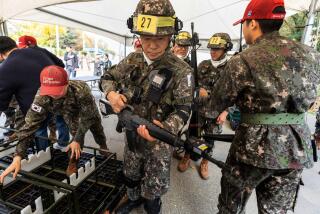Gulf War’s Lesson: The Military Isn’t Just Another Career
The Gulf War is causing students at area high schools to think about, and sometimes change their attitudes toward, military service.
During the past several years of peacetime, career counselors at the schools say, there was a tendency on the part of a lot of students to look upon the military as simply one of many career options. The military recruiters who made frequent appearances on most campuses, especially at college and career fairs, would be peppered with questions about vocational training, future tuition assistance and other benefits.
The war reminds us, however, that military service sometimes entails fighting and dying. It’s not just another job.
This attracts some students and repels others.
At Venice High School, for example, career adviser Francine Johnston says there appears to be a surge in enthusiasm for military service. “Those (military) tables were the most popular” at a recent on-campus career fair, she said. “The kids flocked over to ask questions, and they’ve been asking ever since about military options.”
And although recruiters usually target high school students, even some middle-school students are now asking for information about military service, according to Kathleen Schreiber, a counselor at Culver City High School. “Those kids come up here because they know I have the pamphlets, and they’re coming up here in greater numbers because of this interest in the war,” she said.
Some counselors say interest appears to be declining, however, among black students, a group that has swelled military ranks in recent years.
Some of them say there are too many African-Americans on the front lines. “Naturally a lot of people are concerned about . . . what they feel are a disproportionate number of our (African-American) young people in the area where they can get hurt,” explained James West, a Crenshaw High School career adviser.
West’s Crenshaw colleague, Marilyn Goodman, agreed. “We’re a predominantly black school,” she said, “and our students have heard Jesse Jackson (saying) that blacks are overrepresented in the Gulf. So some of them are saying, ‘I don’t want to do that.’ ”
A few local high schools reported no recent change in the number of students interested in the military, or in their attitudes toward it since the Gulf War began. “The kids here don’t seem to talk about it much,” said Janis Marcy, a college counselor at Santa Monica High School. “We don’t seem to have a lot of kids who go directly into the military.”
Military service has long been an attractive way for some students to get job training or help with college tuition, but counselors now disagree about whether it’s as good an option during a war.
“I think the military offers tremendous benefits, opportunities to our students: money for college, vocational training, a chance to get out of a bad environment,” said John Garnes, a career counselor at Westchester High School.
Venice High counselor Johnston also sees a continued appeal, even during wartime. “These kids want to feel a part--they want a second family, and I think the military provides that for a lot of them,” she said. “It’s real sad. You wish it were different, but at least it’s something.”
Peter Sawaya, a Santa Monica High School teacher, disagrees. “It’s against everything that I’m about,” he said. “As an educator, I’m educating folks for a better life, a fuller life. Then the recruiter comes along and tells them, ‘Join me and go off and die and cut off any chances of a better life.’ ”
Most high school counselors do agree, however, that they play a much less active part in a student’s decision about the military than they do in a decision about college. Culver City’s Schreiber says she remains “totally neutral. I never approach the student about the military unless they first initiate it.”
Says Santa Monica High adviser Marcy: “I never promise the military; I never discourage the military. If a student brings it up, I will definitely try to be very objective and discuss the pros and cons. I don’t pass a value judgment on (the war).”
Added Sawaya: “I have a real hard time understanding the mentality of anybody who would at this point enlist, knowing that they’d be going or possibly be going to fight a war and die.”
But Westchester’s Garnes doesn’t think today’s seniors will be sent to the Gulf War. “I don’t think the Gulf War will be anywhere in sight by the time our present seniors finish their basic training and advanced training,” he predicted. “I think it’s going to be over in two or three months.”
More to Read
Sign up for Essential California
The most important California stories and recommendations in your inbox every morning.
You may occasionally receive promotional content from the Los Angeles Times.










